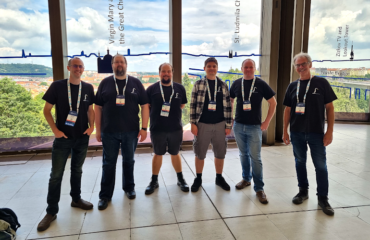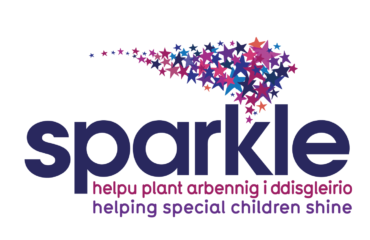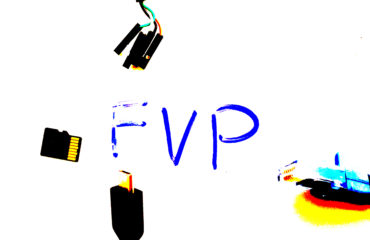It’s already 2024 and we have absolutely no idea what happened to January – it’s been pretty busy so far this year. However, as we come up for air we thought it would be the perfect opportunity to look back at our highlights of 2023. We’d also like to give thanks and appreciation for our customers, employees and partners – we look forward to continue to work together on interesting and challenging projects.
It’s always been important to us to keep our customers happy and deliver on our promises, that’s likely why just under 90% of our work in 2023 came from repeat business or customer referrals. An increase in the demand for our services allowed us to grow our team by an additional 3 engineers over the course of 2023, bringing our head count into double digits for the very first time. We expect to continue growing in 2024 and as we write this post, we’re actively looking for an additional 2 engineers to join our team.
Given the widespread use of Linux, it’s no surprise that our work is deployed in a wide range of markets – in 2023 we worked on projects in consumer, retail, transport, industrial, infrastructure, security and film & TV. We hope to write up some case studies in due course so we can share the interesting work we’ve done. We’ve naturally also worked with a variety of hardware: Many projects this year have involved NXP’s i.MX 6 and i.MX 8 SOCs, we’ve written software for both the Cortex-A and Cortex-M parts of these. We’ve also worked on a variety of NVIDIA Jetson modules such as the Orin NX and Xavier NX, these are usually on projects where we provide (or update) Yocto support for a custom carrier along with software update and security hardening. We’ve worked on Ambarella hardware, TI processors (such as the OMAP-L138 and AM3358), ST’s STM32MP157 and even x86-64 hardware. We’ve also continued to work on ARM’s experimental Morello platform as part of the UK government’s Digital Security by Design (DSbD) challenge. We continue to admire the passion and ability that our engineers have in being able to come up to speed so quickly with new hardware as well as understanding the customer’s context and domain.
We’ve always believed that we can provide maximum value for our customers over the long term when we work in collaboration with, and as an active participant in the open source community. We’re far from where we wish to be, but we’re certainly moving in the right direction. We are now much more proactive at identifying work that is suitable for upstream when we are discussing work packages with customers. For example when a customer asked us to provide support for remote signing of i.MX images via the use of a Hardware Security Module (YubiHSM2) we did so by building upon the pre-existing digsigserver project and upstreaming our changes. We’ve also recently worked on Buildroot support for the Phytec phyBOARD-Sargas development kit and with the blessing of our customer we plan to upstream this soon. Thanks to our work with Iceotope, we’ve also continued to maintain the official Yocto layer for Arm’s Morello platform, though we plan to take it further in 2024 as we’ll soon make public an additional Yocto layer that provides a wider range of packages which have been modified to work with the Morello architecture such as PostgreSQL and OpenSSL. And finally, this year a number of our employees attended the Embedded Open Source Summit in Prague – an excellent way for us to keep up to date and network with those in our community.
If you’ve worked with embedded devices and made use of SD cards, you may well have found that sometimes they wear out over time. We’ve been fortunate to have had some time to investigate how selection of SD cards, usage patterns and write amplification can all have an impact on the life of an SD card. As part of this work, we’ll soon be releasing an open-source package named KrillKounter which can be used in Linux distributions to monitor wear on flash based media. We’ve also recently supported a customer in understanding why SD card write throughput is lower than expected – this was really interesting work that requires an understanding of the path of IO in the Linux kernel. Andrew Murray will be talking about both of these topics in the Open Source Summit in Seattle later this year.
At the end of 2023 Microsoft’s support for Windows Embedded Compact 2013 finally reached end of life meaning that customers no longer have software and security updates. For many customers this has been a good time to make the switch to Linux rather than alternatives such as Windows 10 IOT. As a result in 2023 we supported a couple of customers migrating their industrial based devices from Windows CE variants to Yocto Linux – this has been interesting as the process doesn’t just involve porting drivers and applications from Windows to Linux but it also involves supporting the customer in moving from a Windows to Linux mindset.
Another trend that we have seen is that customers increasingly relying on us for securing their devices – whether that’s to protect their IP or data, prevent unauthorised use of their hardware or to prevent misuse. We generally support customers by implementing secure/encrypted boot, leveraging security features of their SOC, performing security hardening and patching high severity CVEs. But of course once a device is secured and deployed it won’t remain secure unless there is monitoring and patching of newly discovered vulnerabilities. We are now increasingly seeing customers ask us to support them with this monitoring and patching – to help us with this we’ve been working on developing a new service which we hope to roll out this year.
In 2023 we continued to gain experience with new areas of technology. We’ve spent time leveraging WebRTC with GStreamer which has built upon experience we gained in 2022 with WebRTC and LiveKit. We’ve also started working on projects that involve Balena where we’ve provided or customised a BalenaOS BSP. Whilst we’re on the subject of distributions, we’ve also gained experience in building Ubuntu based distributions for custom ARM devices.
As a small growing business in the services sector, the challenge has always been “How can we grow our business and still maintain the consistency and quality of service that our customers expect?”. We felt that addressing this question will allow us to continue to deliver customer satisfaction and build trust in customer relationships. Back in 2022 we identified that we can do this through understanding and documenting how we do what we do (i.e. turning our service into a process), ensuring that we all follow the same processes and then enhancing our processes when we realise we could be doing things better. We also realised that this is a common problem and a recognised solution for this problem is outlined in the international ISO 9001:2015 standard. Throughout 2023 we aligned our business to conform to the ISO 9001:2015 standard and in November we became certified by the UKAS accredited NQA certification body, an achievement we’re really proud of.
And finally, we’ve continued our Christmas tradition of raising money for charities that have impact in the geographical areas where we work. This year our employees chose Macmillan Cancer Support, a charity that supports people living with cancer. We’re pleased to have raised £770 – our JustGiving page is still open so feel free to also contribute.
We’re looking forward to the projects and challenges that are ahead of us in 2024, if you’d like us to assist you with your projects then please don’t hesitate to get in touch, we’d love to heard from you.








